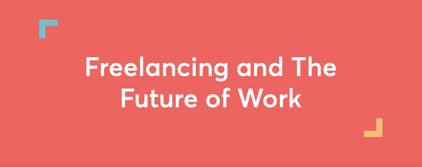- 15 Oct 2019
- 3 mins read
- Posted in
Ask the average person what a freelancer is – never mind the freelancer economy – and they’ll be hard pushed to give you a definitive answer. Unless someone is familiar with the industry or has worked with this group of talent before, that’s perfectly understandable.
Freelancers are basically highly-skilled professionals that operate independently to provide their expertise to organisations for specific projects. At its simplest, the buying and selling of these skills and services makes up the freelancer economy.
The term ‘freelancer’ is actually a more recent version of ‘freelance’, which has early 19th century origins and refers to a mercenary who’d fight for whoever paid them the most. So the concept has been around for a while in different forms, although it was originally two words – free lance (you can find more about the history here).
The Rise of the Freelancing Economy
Over the years, it’s become a popular way of working in the creative sectors such as marketing, design, copywriting and web development. The entertainment sector has worked this way for years and it is prevalent in journalism too.
But it was really at the height of the 2008 global recession that independent working increased. Many people found themselves redundant as companies laid off employees. For a lot of workers, it wasn’t a great time. The conventional job for life and a final pension were also becoming distant memories and people needed to earn extra cash whilst between jobs. It was born out of necessity rather than a lifestyle or career choice.
It was around this exact same time that the ‘gig economy’ emerged, which provided new ways for people to earn income. It’s important to note, however, that there’s a subtle difference between the freelancer economy and the gig economy.
A freelancer will often work with the client for a few weeks or months whereas ‘gigsters’, as they’re known, will normally provide small jobs such as make a delivery, convert a PDF to Word or fix a quick website issue. These tasks can usually be completed in a very short space of time.
Game-changing Technology
Much of the rise in the freelancer economy (and the gig economy) has been helped by technology that allowed transient workers to connect online with potential clients. It became easier than ever to search for talent via LinkedIn or through freelancer and gigster platforms such as PeoplePerHour.com which has been around since 2007.
This made it possible to showcase talent and skills in the public domain making it more readily accessible to prospective clients. Businesses could more easily find individuals that matched their project requirements either by contacting them directly through the platform or by listing a brief and receiving proposals from freelancers.
Technology also opened up the global marketplace, widening the net for both freelancers and organisations. It was more efficient and reduced the need to rely solely on local networking events, marketing and in-person meetings so more time could be spent working on projects. It effectively helped the freelancer economy to prosper.
Supporting Freelance Business Growth
Given that 99.9% of businesses are small or medium-sized enterprises (SMEs) with a combined annual turnover of £2.02 trillion, there’s probably little wonder that the freelancer economy is thriving.
It has allowed organisations to tap into expertise that they otherwise wouldn’t have been able to afford, helping them to scale faster, without having to resort to expensive agencies. Firms could make bite-sized investments in projects – such as the launch of a new micro-site or additional software engineers to help with an app – and there was no long-term contract to get caught up in.
Indeed, even for larger organisations, it provided expertise to supplement existing employee skills or to focus resources on key projects. It can avoid employees being distracted from their core work, allowing freelancer teams to help the business grow.
It also allowed businesses of all sizes to manage expected and unexpected productivity peaks, making them more fluid and agile, able to respond faster to marketplace dynamics without the need to take on extra staff.
In fact, a report by The Association of Independent Professionals and the Self-Employed (IPSE) found that the ‘...contribution of freelancers and the solo self-employed to the UK economy increased in 2017 to £271bn – up from £255bn in 2016. Highly skilled freelancers contributed at least £125bn in 2017 to the economy – up from £119bn in 2016’.
Interestingly, it also found that the growth in self-employment was being driven by these highly-skilled freelancers – not the gig economy. Indeed, the Office of National Statistics (ONS) shows that the fastest rising group of self-employed are those with the highest qualifications, which would also back up this finding.
Last year the Solicitors Regulation Authority (SRA) gave the green light for solicitors to work in a freelance capacity, highlighting the fact that once again highly-skilled professionals see working independently as a valid career, and even preferable, choice.
Alongside the shift in business norms, there’s also been a change in how people view the world of work. Flexibility, control over pricing, and the opportunity for freelancers to channel their expertise into projects they enjoy are part of the attraction. Given they already own the ‘sellable’ asset – their skills and knowledge – the barrier to entry is often low, making it an option for more people.
This includes younger generations that have grown up with technology and often have a different perspective on what it means to have a career, such as following multiple interests with an opportunity to expand and grow personally.
Today, this makes it an enticing proposition, drawing many talented individuals to it as the figures seem to suggest. Given the IPSE is reporting that there are now two million UK freelancers (with a particular prominence in highly-skilled segments such as managerial and technical roles) – up 46% since 2008 – the freelancer economy is proving more buoyant than ever, providing an attractive route for both professionals and businesses alike.

Floris ten Nijenhuis
Speak to us to find out how we can help you pay your contractors more efficiently
Related articles

Top 12 Mental Health and Wellbeing Platforms for 2025
See the top mental health and wellbeing platforms for 2025. From guided meditation to mood tracking, get the best apps to support your employees' health.

How AI is Transforming eLearning
See how AI is transforming eLearning with personalized experiences, content, and predictive analytics, enhancing education for students and teachers alike.

AI in Gaming: The Future of Artificial Intelligence in Game Development
The ultimate guide to AI in the gaming development industry. Learn how Artificial Intelligence is revolutionizing NPCs, game design, and player experiences.

Phoenix Rising: AI-Powered Freelance Talent Discovery Takes Flight
Discover Phoenix: the AI-powered assistant revolutionizing freelance talent discovery. Connect faster, smarter, and more securely with top freelancers.

Top 10 Best Video Animation Agencies
This is an overview of our favorite and best animation agency choices. Check out animation examples of these top animation agencies in our top 10 list.
How to Manage Subject Matter Experts
How to Manage Subject Matter Experts
Unlock the full potential of your projects with our expert guide on managing Subject Matter Experts. Learn strategies for effective collaboration.

Work, Reconstructed
Xenios Thrasyvoulou and Glen Hodgson discusses the main compliance issues that are faced today within the talent and HR sectors.

Freelancing and The Future of Work
Xenios Thrasyvoulou discusses shaking up the employment game, refreshing the tax rulebook, and removing the final hurdles to a super-flexible workforce.
Freelancer vs. Design Agency: Why We Chose to Stay Agile
Freelancer vs. Design Agency: Why We Chose to Stay Agile
When we decided to revamp our website, we took time to consider the pros & cons of freelancers vs design agencies. Here's why we chose a freelancer.
Top 10 best Advertisements from Small Agencies
Top 10 Best Advertising Campaigns from Small Agencies
It's not always the giant agencies creating the best work. Take a look at TalentDesk's top ten picks of our favourite adverts from small & independent agencies.
